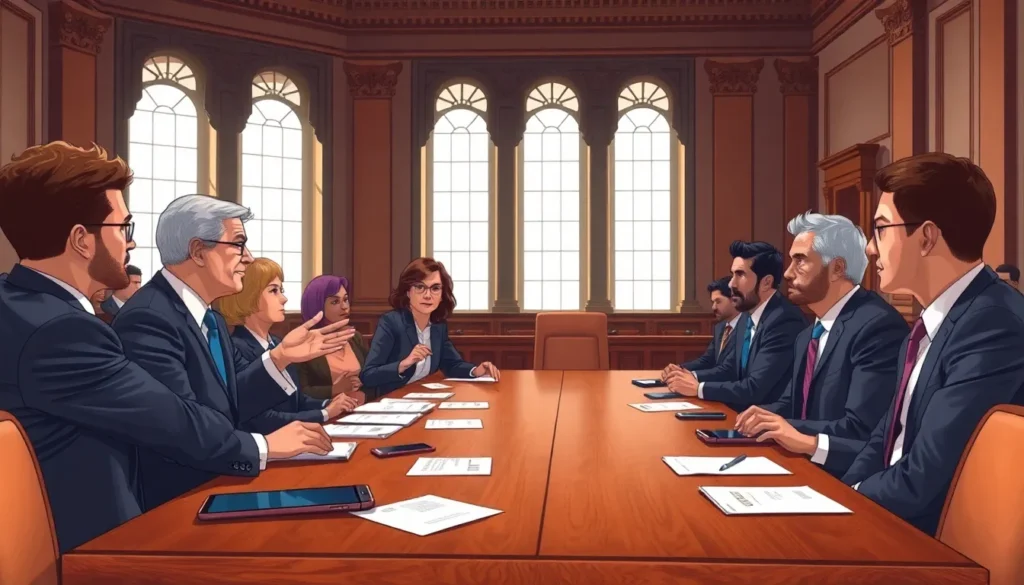In a world where politics often feels like a circus, the Friends Committee on National Legislation (FCNL) stands out as a refreshing voice of reason. With a mission to promote peace, justice, and a government that truly serves the people, it’s like having a wise friend who always knows how to navigate the chaos. They’re not just throwing confetti in the air; they’re rolling up their sleeves and getting to work.
FCNL connects grassroots activism with the halls of Congress, proving that even the smallest voices can make a big impact. If you’ve ever wondered how to turn your passion for change into real action, this committee might just be your new best friend. Join the movement that’s redefining civic engagement—because who said politics can’t be fun?
Table of Contents
ToggleOverview of Friends Committee On National Legislation
Friends Committee on National Legislation (FCNL) serves as a nonpartisan lobbying organization. This committee represents the Quaker perspective within the political sphere, focusing on issues related to peace, justice, and governance. Founded in 1943, FCNL engages with legislators to advocate for policy changes that align with its mission.
Grassroots activism plays a vital role in FCNL’s operations. Through mobilizing supporters, the committee encourages individuals to connect their values with legislative action. Many members participate in campaigns that address critical concerns, such as climate change, military spending, and social justice.
FCNL’s programs facilitate education and advocacy for its constituents. Workshops, webinars, and publications provide resources that empower members to engage effectively with policymakers. Each year, FCNL hosts a “Spring Lobby Weekend” where participants can meet with their congressional representatives.
Policy priorities are shaped by active member involvement. Through meetings, surveys, and consultations, FCNL identifies and addresses pressing national issues. This collaboration ensures that the perspectives of diverse voices are heard in the political dialogue.
Transparency and accountability remain fundamental to FCNL’s approach. It consistently communicates its advocacy efforts and the rationale behind its positions. By providing detailed reports and updates, FCNL fosters trust while encouraging sustained engagement among its members.
This organization exemplifies the connection between grassroots initiatives and national legislative processes. Each effort contributes to the broader goal of creating a more just and peaceful society. Activating and coordinating community efforts strengthens the impact that individuals can have on national decision-making.
History and Background

Friends Committee on National Legislation (FCNL) emerged as a vital player in U.S. politics, promoting peace and social justice through advocacy underpinned by Quaker values. Established in 1943, the committee has a rich history that highlights its commitment to influence legislative processes.
Founding Principles
FCNL’s founding principles center on nonviolence, social justice, and the belief in active engagement. These core values motivate the committee to address crucial issues facing society. Quakers emphasize the importance of personal conscience and collective action. Consequently, FCNL aims to integrate grassroots activism into national conversations, encouraging individuals to change the political landscape. Members strive to uphold transparency and accountability, fostering trust within their community. Through education and advocacy, FCNL empowers individuals to align personal values with legislative initiatives.
Major Milestones
Over the decades, FCNL has achieved significant milestones that underscore its impact. One notable achievement occurred in 1961 with the establishment of the lobby office in Washington, D.C., facilitating direct engagement with lawmakers. In 1970, FCNL played a pivotal role in advocating for the National Environmental Policy Act, showcasing its commitment to environmental protection. The launch of the “Spring Lobby Weekend” in 2002 marked another key moment, encouraging members to advocate directly with Congressional representatives. In recent years, FCNL has focused on critical issues like climate action and military reform, consistently evolving to meet the needs of its members. Each milestone reinforces the organization’s role as a leader in legislative advocacy for peace and justice.
Current Mission and Goals
The Friends Committee on National Legislation (FCNL) focuses on promoting peace, justice, and effective governance through grassroots activism and policy advocacy. It engages individuals in meaningful legislative action aligned with their values.
Advocacy Areas
FCNL prioritizes several key advocacy areas, including climate change, military spending, and social justice. Each area reflects the committee’s commitment to Quaker principles. Climate initiatives push for sustainable policies that protect natural resources. Military spending discussions center on reallocating funds toward humanitarian needs. Social justice advocacy seeks to address systemic inequalities impacting marginalized communities.
Strategic Initiatives
FCNL implements strategic initiatives to enhance its advocacy efforts. Educational programs equip members with tools for effective lobbying. Collaborations with grassroots organizations amplify voices and consolidate efforts. Annual events, such as Spring Lobby Weekend, foster direct engagement with legislators. Through these initiatives, FCNL cultivates a network of informed advocates, ensuring that diverse perspectives influence national legislation.
Impact and Achievements
Friends Committee on National Legislation (FCNL) has made significant strides in promoting peace, justice, and effective governance through its advocacy efforts.
Legislative Outcomes
FCNL successfully advocated for crucial legislation, demonstrating its impact on national policy. Key victories include support for the National Environmental Policy Act, which established a framework for environmental protection. Campaigns addressing military spending have also influenced budget allocations, favoring social programs. Recent initiatives focused on climate change have garnered bipartisan support, ensuring sustainable policies are part of the legislative agenda. The organization’s ability to mobilize grassroots activists amplifies these successes, showcasing how engaged citizens shape legislative outcomes.
Community Engagement
Community engagement remains a cornerstone of FCNL’s approach. Educational programs empower supporters to advocate effectively for issues that resonate personally. Events such as the annual “Spring Lobby Weekend” foster direct interactions between constituents and congressional representatives. Workshops and webinars provide vital skills, increasing participant confidence in advocacy efforts. Local chapters of FCNL coordinate grassroots activities, promoting collaboration among members. This dynamic involvement enriches the political discourse and further solidifies the connection between citizens and their lawmakers.
Challenges and Future Outlook
FCNL faces several challenges in its mission to influence national legislation effectively. One primary challenge is the polarized political climate, making it difficult for nonpartisan organizations to find common ground among lawmakers. Engaging in constructive dialogue remains essential for FCNL as it attempts to bridge these divides.
Funding also presents a significant hurdle. While grassroots support is vital, securing sustainable financial resources requires ongoing efforts. Current members play an active role in fundraising, but expanding the supporter base proves crucial to maintain momentum.
Advocacy efforts are shaped by current events and issues, which can distract from long-standing priorities. Rapid changes in public opinion or emergent crises can skew focus away from pressing matters like climate change and social justice. FCNL adapts by updating its messaging and priorities to reflect these shifts.
Furthermore, FCNL’s engagement with younger generations is critical as they represent the future of advocacy. Encouraging youth participation in grassroots activism involves educational initiatives targeting schools and universities. Innovative programs can help connect young activists with FCNL’s mission, fostering community involvement.
Looking ahead, potential opportunities for collaboration may emerge. Partnering with other organizations can amplify FCNL’s voice and influence in national and local policy discussions. Strengthening ties with diverse communities will enhance the coalition’s impact, reinforcing the commitment to social justice and peace.
Navigating current challenges while embracing potential growth opportunities defines the future for FCNL. As grassroots activism remains at the core of its mission, fostering broader engagement ensures FCNL effectively mobilizes efforts to create lasting change.
The Friends Committee on National Legislation stands as a beacon of hope in a turbulent political environment. Its commitment to peace and justice inspires individuals to transform their passion into action. By fostering grassroots activism and connecting it to legislative processes, FCNL empowers citizens to influence meaningful change.
As it navigates challenges and embraces opportunities, the organization remains dedicated to amplifying diverse voices in policy discussions. Engaging with FCNL not only enriches personal advocacy efforts but also strengthens the collective push for a more just and equitable society. The future of civic engagement is bright with FCNL at the forefront, encouraging everyone to take part in shaping the policies that impact their lives.



